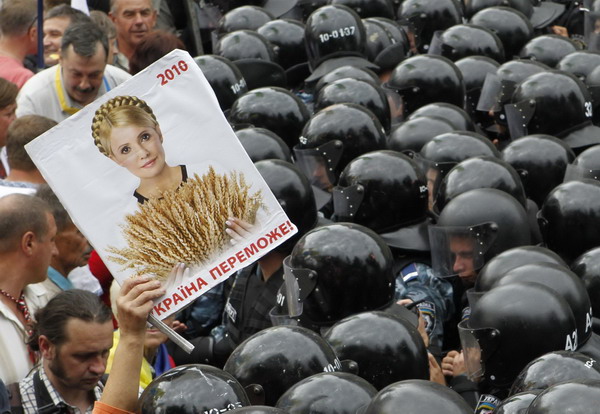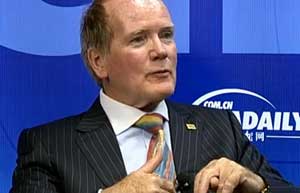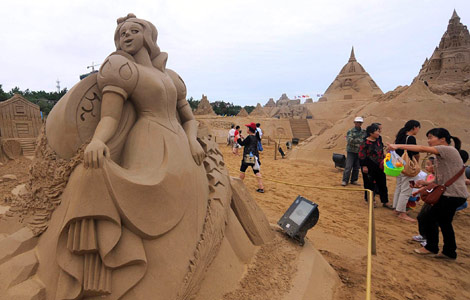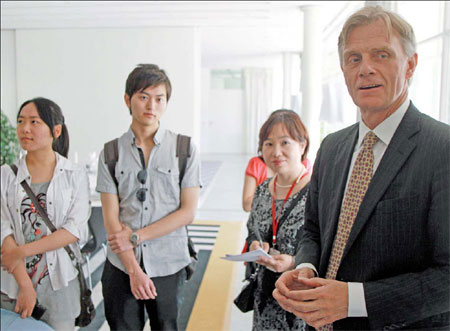Ukraine seeks 7 years jail for Tymoshenko
Updated: 2011-09-28 11:07
(Agencies)
|
|||||||||
|
 A Ukrainian opposition supporter holds a placard displaying former Prime Minister Yulia Tymoshenko during a rally on the 20th anniversary of Ukraine's Independence in Kiev Aug 24, 2011. [Photo/Agencies]
|
Tymoshenko, 50, Ukraine's most prominent opposition politician, is charged with abuse of office linked with a gas deal with Russia in January 2009 which the leadership of President Viktor Yanukovich says saddled the country with an exorbitant price for gas. She denies this.
The United States and the European Union say the trial is politically motivated and they have urged Yanukovich to find a way of ending the case against her.
But when the trial resumed on Tuesday after a two-week break, prosecutor Liliya Frolova said the case against Tymoshenko had been "fully proven" and she called for a prison term of seven years.
Tymoshenko, who lost a bitter campaign for the presidency to Yanukovich in February 2010 and has denounced the trial as a vendetta against her, told the court: "This is a continuation of political repression and I am convinced that they are doing this on the orders of President Yanukovich."
The Yanukovich leadership says her action in pressuring the state energy firm Naftotgaz into signing an agreement with the Russian gas giant Gazprom in 2009 endangered the national interest.
The trial has polarised public opinion in the ex-Soviet republic and caused street demonstrations against Yanukovich. It was adjourned on September 12 until Tuesday after the United States and the EU expressed concern over her prosecution.
Since then, the EU has hardened its position further, warning Yanukovich it could scrap planned bilateral deals on free trade and political association if Tymoshenko is jailed.
"At the rate the trial is going it may be over by Thursday," said defence counsel Yuri Sukhov after Frolova had called for the seven-year jail term.
Tymoshenko, a charismatic populist, doomed Yanukovich's first bid for the presidency in 2004 by leading street protests against him which became known as the "Orange Revolution."
She has been at daggers drawn with him since then.
Defiant
During a court recess earlier on Tuesday, she showed her old defiance despite being held in police custody since August 5, telling journalists: "This absurd show needs to be ended."
"I want to remind Yanukovich - wherever I am, in jail or at liberty, I feel a free person," she said.
Hundreds of Tymoshenko supporters have been camped outside the courtroom throughout the summer in solidarity with her. Riot police took up their positions near the courtroom when the hearing resumed though there was no serious trouble beyond some minor scuffles.
On the eve of the trial resuming, Prime Minister Mykola Azarov said Russia had finally agreed to review the 2009 gas contract which is the basis of the prosecution's case against her. A spokesman for Gazprom said talks were still continuing.
But Tymoshenko, speaking to journalists, accused Ukrainian authorities of readying themselves to surrender control of the gas transit system to Russia.
The trial was adjourned on September 12 after the United States and the EU expressed concern over her prosecution.
Since then, the EU has hardened its position further, warning Yanukovich it could scrap planned bilateral deals on free trade and political association if Tymoshenko is jailed.
Yanukovich's government, which says integration in the European mainstream is the bedrock of its foreign policy, hopes to initial these agreements with the EU at a summit in December.
Before then he has to face top EU officials at a "partnership" summit in Warsaw on September 29-30.
The EU says the Yanukovich leadership has responded favourably to a suggestion that it reclassify the charge against her so as to allow her to go free.
But his administration comprises hardliners who want to see Tymoshenko extinguished as a political force.
Any changes to the law to "decriminalise" the charge against Tymoshenko is likely anyway to take weeks, perhaps months, to pass through parliament, observers say.
The court judge placed the fiery Tymoshenko in police detention on August 5 for "systematically" disrupting court proceedings and has refused many pleas by her defence for her to be released from custody during the trial.
Many commentators say the trial has turned into a public relations disaster for Yanukovich, bringing criticism from the West and resurrecting Tymoshenko as a political force.










